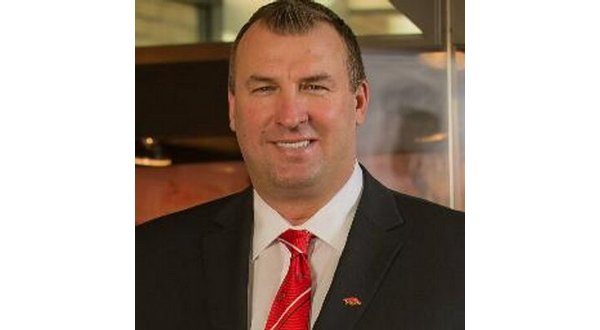
Attorneys representing the Razorback Foundation, the private fundraising arm that raises millions of dollars in support of the University of Arkansas athletics department, filed a motion Friday to dismiss a lawsuit brought by former head football coach Bret Bielema.
The former coach filed a breach of contract lawsuit in federal court in Fayetteville on June 12, demanding $7.02 million and a jury trial. A PDF of the suit is at this link.
Bielema, now an assistant coach for the New York Giants in the National Football League, is at odds with the Razorback Foundation over the unpaid amount of a buyout agreement following his dismissal as head coach. The UA fired Bielema Nov. 24, 2017, following a 48-45 loss to Missouri and capping a 4-8 season.
In its response filed Friday, Rogers attorney Marshall Ney claims Bielema preemptively filed suit to avoid being sued himself in Washington County Circuit Court and presumably to frame the media’s report of the dispute. Ney, a partner at Friday, Eldredge & Clark, is the lead counsel representing the Razorback Foundation.
According to the filing, Bielema and the Razorback Foundation agreed in January 2018 that the coach was owed an $11.9 million buyout. As part of the agreement, a specific clause stipulated Bielema was to put forth a good-faith effort to find another job, to mitigate the foundation’s financial obligations.
According to the filing, Bielema finding a job that paid more than $150,000 would have satisfied that obligation.
In early 2018, Bielema began working for the New England Patriots as an independent contractor to assist the Patriots’ coaching staff in assessing NFL draft prospects. The Patriots paid Bielema $25,000 for seven weeks of work under that arrangement. In July 2018, New England hired Bielema as special assistant to the Patriots, which carried an annual salary of $100,000.
According to Bielema’s lawsuit, the foundation sent him a demand letter on Jan. 31, 2019, accusing him of being “well aware” of his “material breaches” and that he had “made no efforts, diligent or otherwise, to obtain replacement employment of the same or similar character.” The foundation demanded Bielema return more than $4.2 million it had already paid him in monthly buyout payments.
The clause of the buyout agreement regarding Bielema’s job search is the focal point of the dispute between the two sides, Ney explained.
Ney also compared Bielema’s situation to former Razorback coach Chad Morris. The UA fired Morris this past November, before the end of the regular season. One month later, Auburn University hired Morris as offensive coordinator. Morris agreed to a three-year contract worth $735,000 annually, according to published reports. The UA still owes Morris millions in buyout money, but that amount is considerably less, since the amount the Tigers are paying him will mitigate that total.
Ney said in the filing that Bielema’s suit is full of baseless claims, untrue facts and mischaracterizations. He also argues that the federal court is an improper venue for the lawsuit, and grounds to dismiss the suit, based on Bielema’s contention in the original complaint that the Razorback Foundation is an arm of the state.
Tom Mars, who splits time between offices in Rogers and Atlanta and was at one time the general counsel for Walmart Inc., is the lead counsel for Bielema. Other counsel listed in the lawsuit for Bielema includes R. Craig Wood and Benjamin P. Abel of Charlottesville, Virginia.; John C. Everett of Farmington; John E. Tull of Little Rock; and Ryan K. Culpepper of Hot Springs.
In an email to Talk Business & Politics on Friday, Wood declined to comment on the Razorback Foundation’s response.
Bielema’s five-year record at Arkansas was 29-34, including an 11-29 record in the Southeastern Conference. He was named the 32nd head coach in program history in December 2012 when he left a successful head coaching position at the University of Wisconsin. Under his direction at the UA, the football program was never cited for any significant lapses or violations.
WebReadyTM Powered by WireReady® NSI










